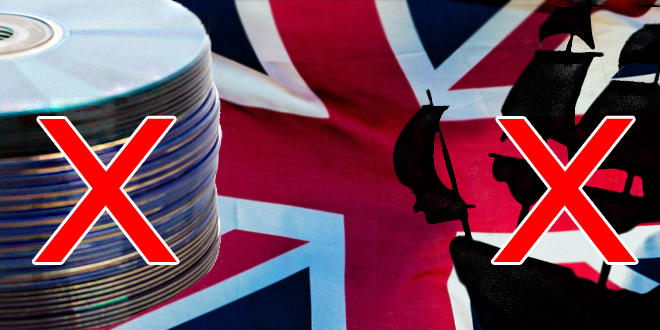The United Kingdom has continued a crackdown on people who download content illegally, but it may have effects on how you use your personal files. After recommendations by the UK Intellectual Property Office, government officials may move forward and decide to increase the maximum sentence for online piracy from two years to ten years. Officials say that the original two year maximum is not enough to deter pirates. These sentences are primarily for commercial level offenses, typically those who download or offer copyrighted content for their own personal gain, such as selling software off the market. This could include the operators of torrent sites where programs are downloaded, such as The Pirate Bay. Individual users most likely would not be brought in for such a long prison sentence, however the impact on websites is expected to also deter users who download illegal content.
This is not the only anti-piracy measure the UK government has announced this week. The High Court also announced that they would be overturning exceptions issued that had allowed users to store copyrighted content from CDs and devices on their computer. The exception to copyright law argued that those who rip CDs do it strictly for personal use, normally out of convenience to store their music, movies, and other content on portable devices or back them up in case they could not access them. The High Court however decided this factor didn’t matter, and overturned the exception. Creative industries have lauded the decision, with UK Music, a lobbying group for the music industry, saying “It is vitally important that fairness for songwriters, composers and performers is written into the law. My members’ music defines this country”.
Many have already noted that this law is near completely unenforceable, since it is impossible to tell who stores music for strictly personal use. It is one of many very strict anti-piracy laws in the UK, who launched a massive campaign against illegal downloading last year, when it began sending warnings to those who download content on a regular basis. UK downloaders were also targeted by several video game companies, including Atari and Techland, to set an example of thousands of pirates, who received fines from £300. The source of many of these laws, along with the Intellectual Property Office and lobbying groups from creative industries, is the British Phonographic Industry, who has advocated for intellectual property rights since 2010. This has included sending complaints to Google over torrent sites and download links being accessible by their search engine. The BPI, unlike some advocacy groups, tends to target those who upload copyrighted material for sharing over individual downloaders though.
Whether any of these new policies will deter serial pirates is yet to be seen. The Pirate Bay, the most well-known source of illegal downloads, has been banned in the UK (along with many other countries) and shut down dozens of times over the course of its history. Despite this, the site continues to reappear shortly after it’s taken down every time, and determined users can find ways around the ISP block to access Pirate Bay’s content. If history is any indicator, increased punishments likely will not do much to stop piracy in the UK.
Update: The original article erroneously claimed the 10 year anti-piracy sentence was already in effect. It is in fact in consultation, but has not yet been enacted. Apologies for the confusion.







